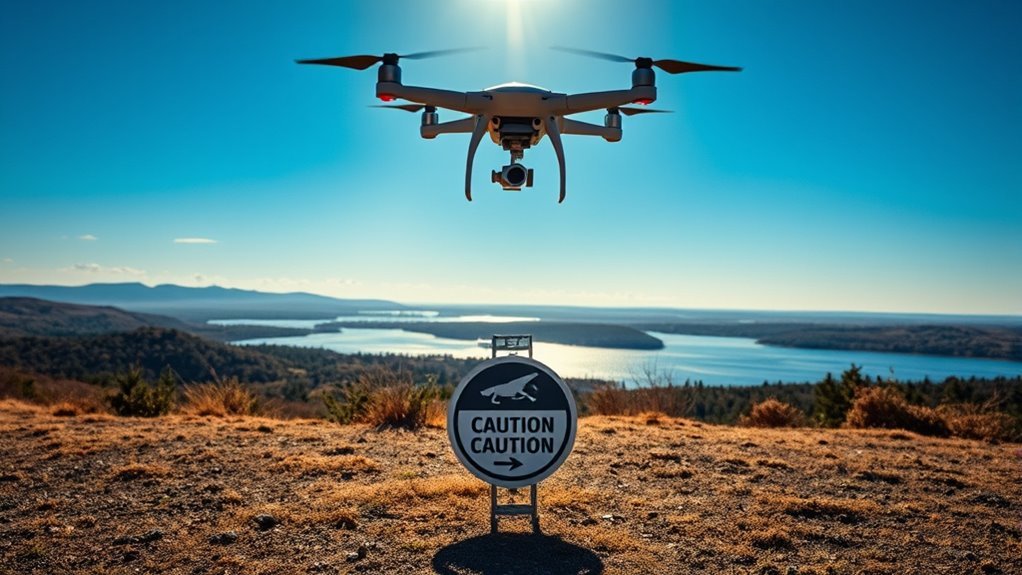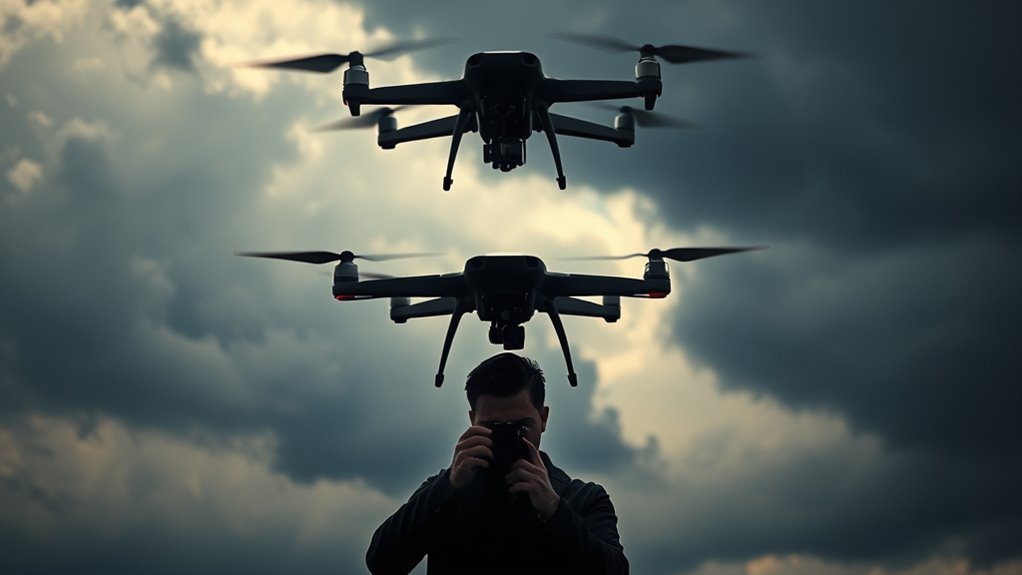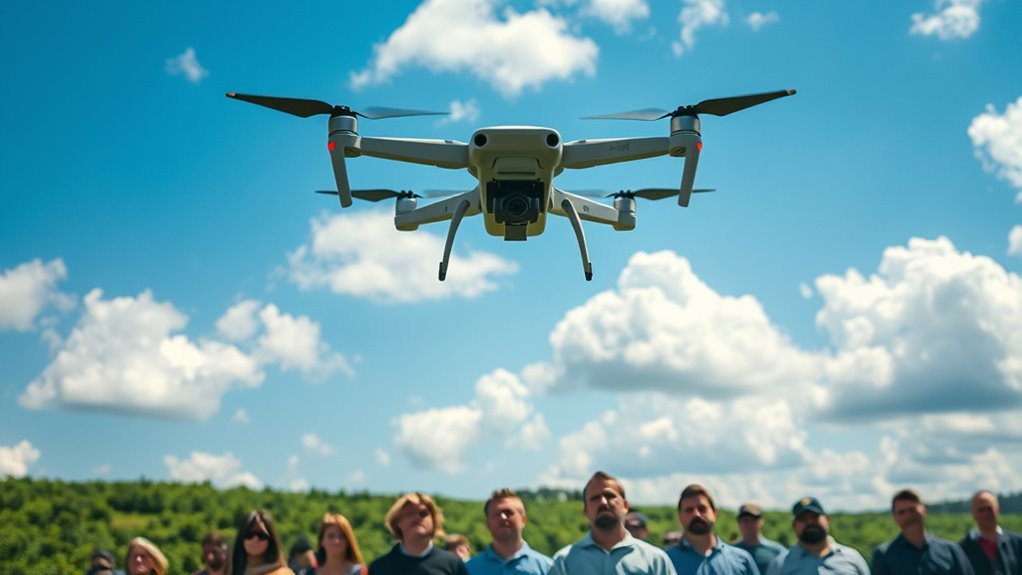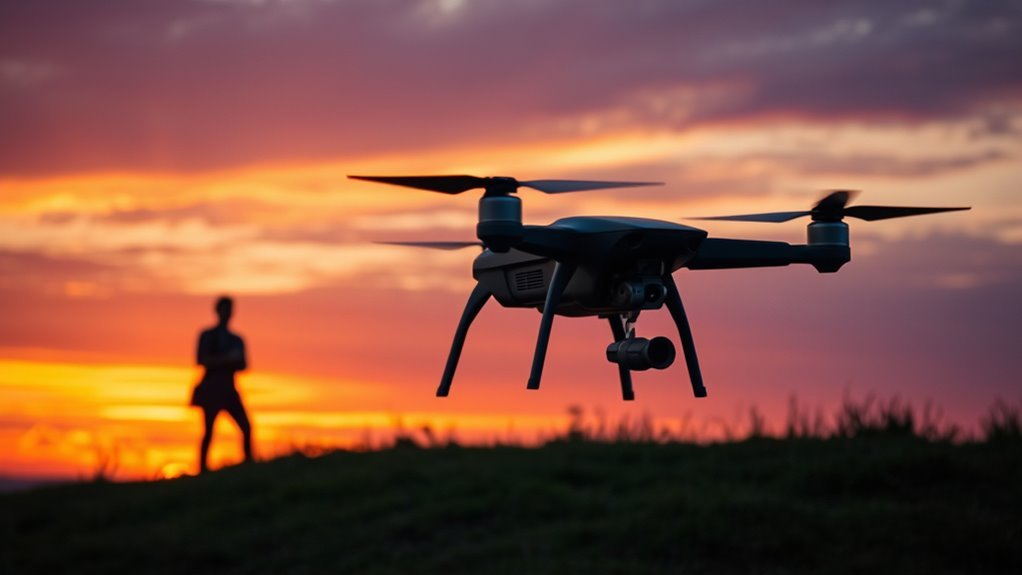Shooting a drone can lead to significant legal risks, potentially categorized as a felony, depending on your state and federal laws. You might face civil lawsuits for destruction of property, alongside possible criminal charges, which can include hefty fines or imprisonment. Property rights don’t grant the right to shoot a drone, and self-defense claims are complicated. Understanding these nuances is essential for avoiding legal trouble, and more insights on this topic can enhance your knowledge further.
Overview of Drone Regulations

As drone usage has proliferated, understanding the regulations governing their operation becomes essential for anyone considering taking action against them. The landscape of drone regulations is constantly evolving, with regulation updates frequently aimed at enhancing drone safety while balancing individual rights. Familiarizing yourself with these rules is important to avoid legal repercussions. The Federal Aviation Administration (FAA) outlines specific guidelines regarding airspace, operational limits, and pilot certification, all intended to promote safe drone operation. Furthermore, local laws may impose additional restrictions, making it imperative to research your area’s regulations. Ignorance of these rules can lead to significant legal risks, underscoring the significance of informed decision-making when contemplating actions against drones in your vicinity.
The Definition of a Drone Under the Law

Drones, or unmanned aerial vehicles (UAVs), are defined under the law as aircraft that operate without a human pilot onboard. This drone definition encompasses a variety of models, from recreational to commercial applications. In legal terminology, drones are classified based on weight, purpose, and operational parameters, distinguishing them from traditional manned aircraft. Understanding this classification is essential for individuals interested in the legal implications surrounding drone use. Knowing the specific regulations that apply to different types of drones can empower you to navigate the legal landscape effectively. Whether you’re a hobbyist or a commercial operator, being aware of the legal definition and framework can help you exercise your freedom responsibly while minimizing potential legal risks.
Legal Consequences of Shooting a Drone

If you consider shooting down a drone, it’s vital to understand the serious legal ramifications that may follow. While you might feel that drone ownership infringes on your property rights, taking matters into your own hands can lead to significant consequences. Shooting a drone could be viewed as destruction of property, potentially resulting in civil lawsuits from the owner for damages. Additionally, local and federal laws might classify such actions as criminal offenses, which could carry hefty fines or even imprisonment. It’s important to evaluate whether the perceived threat justifies such a drastic response. Always explore legal avenues for addressing your concerns instead of resorting to potentially unlawful actions that could jeopardize your freedom.
State vs. Federal Laws Regarding Drones
Understanding the legal landscape surrounding drones requires a nuanced look at both state and federal laws. While federal regulations primarily govern airspace and safety standards, state regulations can impose additional restrictions on drone usage. This dual framework can create confusion and, potentially, legal risks for those considering shooting a drone.
- State regulations might criminalize shooting a drone, leading to fines or imprisonment.
- Federal regulations could classify shooting a drone as an aviation offense, resulting in severe penalties.
- The disparity between state and federal laws can leave you vulnerable to unexpected legal consequences.
Navigating these laws is essential for anyone who values their freedom and wants to avoid legal entanglements over drone interactions.
Self-Defense and Justification for Shooting a Drone
While the concept of self-defense typically applies to human threats, the question of whether it can be extended to drones poses unique legal challenges. Self-defense laws generally require a reasonable belief of imminent harm, which complicates scenarios involving drones. If a drone invades your privacy or surveils you without consent, you might feel threatened. However, the legal justification for shooting a drone depends on whether that invasion equates to a legitimate threat, which courts have yet to clearly define. Moreover, shooting down a drone could lead to legal repercussions, especially if it’s identified as property rather than a direct threat. Understanding the nuances of self-defense laws and drone privacy is crucial to maneuvering potential legal ramifications effectively.
Case Studies and Legal Precedents
To grasp the legal complexities surrounding shooting a drone, you should consider notable legal cases that have shaped current interpretations. Different states have unique regulations that can considerably affect the legal outcome in such scenarios. Additionally, understanding how these legal decisions impact civil liberties is essential for an all-encompassing evaluation of the risks involved.
Notable Legal Cases
As legal frameworks surrounding drone operations evolve, examining notable legal cases provides critical insights into the complexities of shooting a drone. These cases illustrate the potential consequences and legal ramifications, highlighting how personal freedoms can clash with safety and regulation.
- A farmer shot down a drone surveying his land, resulting in felony charges.
- A homeowner faced legal action after shooting a drone hovering over his property, citing privacy invasion.
- An individual was acquitted for destroying a drone, claiming self-defense from perceived threats.
These drone incidents underline the delicate balance between individual rights and legal accountability. Understanding these notable legal cases can help you navigate potential risks in a landscape where personal freedom and legality often intersect.
State-Specific Regulations
Understanding state-specific regulations regarding drone operations is essential, especially considering the legal precedents that vary markedly across jurisdictions. Each state has its own laws governing drone ownership and usage, which can affect your rights and responsibilities. For instance, some states impose strict penalties for shooting down a drone, classifying it as a felony, while others may allow for self-defense arguments under certain circumstances. Familiarizing yourself with these state laws is vital to avoid potential legal pitfalls. Additionally, case studies reveal how courts interpret these laws differently, emphasizing the importance of local context. Ultimately, understanding these nuances can empower you to navigate the complexities of drone regulations while safeguarding your liberties.
Impact on Civil Liberties
The interplay between drone regulations and civil liberties raises significant legal questions, particularly when examining case studies and precedents. As you consider the implications of shooting down a drone, reflect on the broader context of privacy concerns and surveillance issues:
- Unwarranted Surveillance: Drones often invade personal space, amplifying fears over constant monitoring.
- Legal Consequences: Shooting a drone might lead to criminal charges, potentially infringing on your right to defend your privacy.
- Public Sentiment: Increasing awareness of drone technology fuels debates about personal autonomy and the limits of governmental oversight.
The balance between national security and individual freedoms remains a contentious issue, demanding careful consideration of both your rights and the regulations that govern drone use.
Best Practices for Drone Operators and Property Owners
While steering through the complexities of drone operations, both operators and property owners must adhere to best practices to mitigate legal risks. Prioritizing drone safety and respecting property rights is essential. Here’s a concise guide:
| Best Practices | Description |
|---|---|
| Know the Law | Familiarize yourself with local and federal regulations on drone use. |
| Communicate | Inform property owners before flying over their land to avoid misunderstandings. |
| Respect Privacy | Avoid capturing images or videos that violate personal privacy rights. Additionally, understanding airspace classifications is crucial to ensure compliance with operational areas. |
Additionally, understanding airspace rights is crucial for both parties to prevent potential legal conflicts.
Frequently Asked Questions
Can I Face Civil Penalties for Shooting a Drone?
Yes, you can face civil penalties for shooting a drone. If it causes property damage, you might be liable for civil damages, which could result in financial consequences, depending on the drone’s ownership and circumstances.
How Do Insurance Policies Cover Drone-Related Incidents?
When considering drone insurance, think about the balance between protection and responsibility. Liability coverage can safeguard you from financial losses, yet it won’t shield you from legal consequences if you intentionally damage someone else’s drone.
What Are the Implications for Law Enforcement Shooting Drones?
When law enforcement shoots drones, it raises concerns about adherence to law enforcement protocols and drone safety measures. This action can escalate tensions, impact public perception, and complicate legal frameworks surrounding drone operations and rights.
Are There Specific Drone Shooting Laws in My State?
You should check your state laws regarding drone regulations, as they vary markedly. Understanding these laws is essential for ensuring you’re compliant and aware of potential legal consequences associated with shooting down drones in your area.
How Does International Law View Shooting Drones?
International drone laws often emphasize drone sovereignty issues, recognizing national airspace rights. If you’re considering shooting a drone, be aware that international regulations vary, and actions could lead to serious diplomatic and legal consequences.

